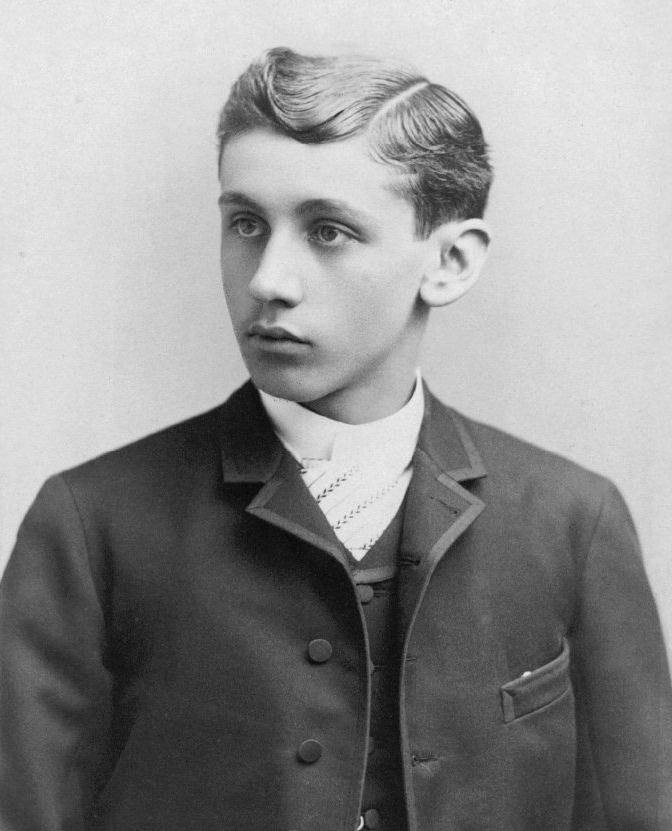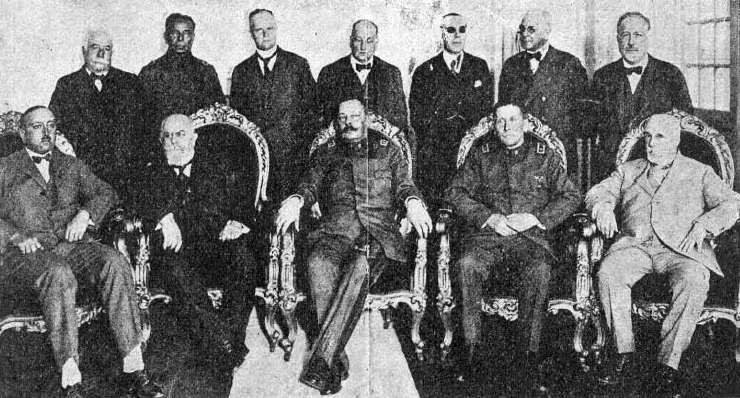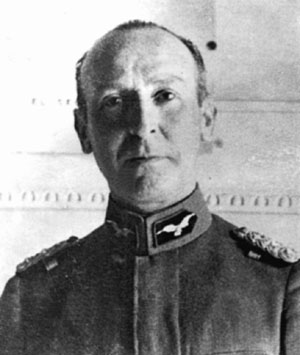|
January Junta
Government Junta of Chile (January 27, 1925 - March 20, 1925) (also known as the ''January Junta''), was the political structure established to restore power to President Arturo Alessandri, after he had been deposed in 1924. On January 23, 1925, a military movement of young officers, wrestled power from the previous September Junta. Then they organized a new Junta and recalled president Alessandri back to his post. The Junta lasted until Alessandri's resumption of power. Creation After the September Junta had been a few months in power, the "military committee", led by Colonel Marmaduque Grove and Lieutenant Colonel Carlos Ibáñez del Campo, started to suspect that a Conservative restoration was under way. The fears seemed confirmed when Ladislao Errazuriz, head of the conservative party, suddenly presented his candidacy to the upcoming presidential elections. So, on January 23, 1925 they launched the Chilean coup of 1925: army troops surrounded the La Moneda Palace and arreste ... [...More Info...] [...Related Items...] OR: [Wikipedia] [Google] [Baidu] |
Arturo Alessandri
Arturo Fortunato Alessandri Palma (; December 20, 1868 – August 24, 1950) was a Chilean political figure and reformer who served thrice as president of Chile, first from 1920 to 1924, then from March to October 1925, and finally from 1932 to 1938. He was a member of the Liberal Party. Early life Arturo Alessandri was the son of Pedro Alessandri Vargas and Susana Palma Guzmán. His grandfather, Pietro Allesandri Tarzi, was an Italian immigrant from Tuscany who had arrived in Chile from Argentina in 1850. Alessandri’s father, Pedro, became head of the family at the age of 19; at the time of Alessandri’s birth, he ran an estate in Longaví. At the age of 12, Alessandri enrolled at the Sacred Hearts High School, where his brothers and father had studied. At the age of 20, Alessandri began his legal studies at the University of Chile.'' The International Who's Who 1943-44''. 8th edition. George Allen & Unwin, London, 1943, p. 11. In 1891, while studying, he participated i ... [...More Info...] [...Related Items...] OR: [Wikipedia] [Google] [Baidu] |
Government Junta Of Chile (1924)
Government Junta of Chile (September 11, 1924 - January 23, 1925), (also known as the ''September Junta'') was the political structure established to rule Chile following the anti-conservative military coup that assumed power after first interfering in progressive President Arturo Alessandri's deadlocked government. It ruled the country until it was ousted by yet another military coup, and gave way to the January Junta. Creation During most of 1924, Chile had been politically paralyzed by a conflict between the President and the conservatively controlled congress, who refused to discuss the laws that he sent them. On September 3, 1924 a group of 56 military officers protested for their low salaries, in the incident known as the ''rattling of the sabres''. The next day the same group of young military officers, led by Colonel Marmaduke Grove and Major Carlos Ibáñez, created a "military committee" to defend themselves from threatened sanctions by the government in response to th ... [...More Info...] [...Related Items...] OR: [Wikipedia] [Google] [Baidu] |
Marmaduque Grove
Marmaduke Grove Vallejo (July 6, 1878 – May 15, 1954), was a Chilean Air Force officer, political figure and member of the Government Junta of the Socialist Republic of Chile in 1932. Early life Grove was born in Copiapó, Chile, the son of lawyer, José Marmaduke Grove Avalos and Ana Vallejo Burgos. His first studies were in School Nº 1 of Copiapó and later at the local Liceum. From a very young age he was interested in the army, and in 1892, was accepted to the Chilean Naval Academy. Very shortly before graduation, he participated in the so-called " Stale-bread rebellion", as a result of which he was expelled from the navy. That incident proved to be his turning point and from then on he declared his motto to be an "''undying love for the underdogs and for true justice''". In 1897, Grove was accepted in the Military Academy, from which he graduated as an artillery sub-lieutenant. At the Military Academy, he was a classmate of Carlos Ibáñez del Campo and Arturo Puga, b ... [...More Info...] [...Related Items...] OR: [Wikipedia] [Google] [Baidu] |
Carlos Ibáñez Del Campo
General Carlos Ibáñez del Campo (; 3 November 1877 – 28 April 1960) was a Chilean Army officer and political figure. He served as president twice, first between 1927 and 1931, and then from 1952 to 1958, serving for 10 years in office. Early life Carlos Ibáñez del Campo was born to Francisco Ibáñez and María Nieves del Campo. On his father's side, his family descended from the Irish captain, John Augustine Evans, a native of Galway, who arrived in Chile in 1730 after the shipwreck of HMS Wager on the island of the same name, and who Hispanicized his surname. Captain Evans contacted Ambrosio O'Higgins, Governor of Linares, who entrusted him with the administration of the Royal Treasury of Perquilauquén. Ibáñez's ancestors include members of the Alvarado family of Spanish conquistadors. He was a direct descendant of García de Alvarado. On his maternal side, he is descended from the Frenchman Giles Du Champ, who arrived in Chile in 1700 and settled in Concepci ... [...More Info...] [...Related Items...] OR: [Wikipedia] [Google] [Baidu] |
Ladislao Errazuriz
Ladislao is a given name, a Hispanic variant of Vladislav. Notable people with the name include: * Ladislao Cabrera, Bolivian hero during the War of the Pacific * Ladislao Diwa, Filipino patriot * Ladislao Martínez, Puerto Rico musician * László Kubala (1927–2002), Hungarian footballer, known as Ladislao Kubala in Spanish * Ladislao Mazurkiewicz, Uruguyan former goalkeeper * Ladislao Vajda, Hungarian film director See also * Ladislao Cabrera Province, province in the Oruro Department, Bolivia * Ladislaus (other) Ladislaus ( or according to the case) is a masculine given name of Slavic origin. It may refer to: * Ladislaus of Hungary (other) * Ladislaus I (other) * Ladislaus II (other) * Ladislaus III (other) * La ... {{given name ... [...More Info...] [...Related Items...] OR: [Wikipedia] [Google] [Baidu] |
Chilean Coup Of 1925
Chilean may refer to: * Something of, from, or related to Chile, a country in South America * Chilean people * Chilean Spanish * Chilean culture * Chilean cuisine * Chilean Americans See also *List of Chileans This is a list of Chileans who are famous or notable. Economists * Ricardo J. Caballero – MIT professor, Department of Economics * Sebastian Edwards, Sebastián Edwards – UCLA professor, former World Bank officer (1993–1996), prolific aut ... * {{disambig Language and nationality disambiguation pages ... [...More Info...] [...Related Items...] OR: [Wikipedia] [Google] [Baidu] |
Palacio De La Moneda
Palacio de La Moneda (, ''Palace of the Mint''), or simply La Moneda, is the seat of the president of the Republic of Chile. It also houses the offices of three cabinet ministers: Interior, General Secretariat of the Presidency, and General Secretariat of the Government. Located in downtown Santiago, it occupies an entire block in the Civic District, bordered by Moneda street to the north, Morandé street to the east, Alameda del Libertador Bernardo O'Higgins to the south, and Teatinos street to the west. History La Moneda, was the colonial mint house of the city during colonial times, was designed by the Italian architect Joaquín Toesca. Construction began in 1784 and was opened in 1805. The production of coins in Chile took place at La Moneda from 1814 to 1929. In June 1845 during president Manuel Bulnes's administration, the palace became the seat of government and presidential residence. In 1930, a public square—named '' Plaza de la Constitución'' ("Constitution ... [...More Info...] [...Related Items...] OR: [Wikipedia] [Google] [Baidu] |
Luis Altamirano
Luis Altamirano Talavera (July 5, 1867 – July 25, 1938) was a Chilean military officer, minister, Vice President of the Republic and finally president of the Government Junta of Chile between 1924 and 1925. He was born in Concepción on the son of Eulogio Altamirano Araceda and Antonia Adelina Talavera Appleby. He studied law and started a career in the ministry of Justice. During the 1891 Chilean Civil War, he joined the congressional army as an artillery captain. He was a lieutenant colonel by the end of it, a year later. After the end of revolution he left the army, only to return in 1897. The year after, he was named commander of Regiment Nº3 of artillery. In 1908 was promoted to full colonel, and named Under-Chief of General staff. In 1911, he was sent as military attaché to the Chilean embassy in Berlin. In 1912, was promoted to brigadier general, and named Inspector General of artillery, and Army Chief of staff. In 1919 was promoted to division general, and named ... [...More Info...] [...Related Items...] OR: [Wikipedia] [Google] [Baidu] |
Pedro Dartnell
Division General Pedro Pablo Dartnell Encina (December 24, 1873 – September 26, 1944) was a Chilean military officer and member of the Government Junta of Chile in 1925. Early life Dartnell was born in the city of Linares in 1873, the son of Robert Loder Dartnell and of Carmen Encina Ibáñez. He studied engineering at the Universidad de Chile, specializing in military engineering. In 1885 he was accepted as an Officer Cadet to the Military Academy, where he studied until 1891. He was promoted to sub-lieutenant on January 15, 1891. During the 1891 Chilean Civil War, Dartnell served with the corps of military engineers, and joined the ranks of the Congressional Army. He participated in the battles of Concón and Placilla. That same year he was promoted to Lieutenant and then Captain. After the end of the war, he studied civil engineering at the University of Chile. With the great reform of the Chilean Army, he was sent to specialize in Europe. He travelled to Belgium, Ger ... [...More Info...] [...Related Items...] OR: [Wikipedia] [Google] [Baidu] |
Emilio Ortiz Vega
{{disambiguation ...
Emilio may refer to: * Emilio Navaira, a Mexican-American singer often called "Emilio" * Emilio (given name) * ''Emilio'' (film), a 2008 film by Kim Jorgensen See also * Emílio (other) * Emilios (other) Emilios, or Aimilios, (Greek: Αιμίλιος) is a variant of the given names Emil (other), Emil, Emilio (other), Emilio and Emílio (other), Emílio, and may refer to: *Aimilios Veakis, Greek actor *Aimilios Papathanas ... [...More Info...] [...Related Items...] OR: [Wikipedia] [Google] [Baidu] |
Emilio Bello
Emilio Bello Codesido (13 July 1868 – 3 March 1963) was a Chilean lawyer, diplomat, deputy and President of the Government Junta that ruled Chile in 1925. He was the son of Andrés Ricardo Bello, and grandson of Andrés Bello, who authored the Civil Code of Chile. He did his early studies at the Colegio inglés, the Instituto Nacional and the Universidad de Chile, graduating as a lawyer in 1889. Due to his support of president José Manuel Balmaceda during the 1891 Chilean Civil War, he was forced to exile himself. He later was allowed to return and organized the Liberal Democratic Party Several political parties from around the world have been called the Liberal Democratic Party, Democratic Liberal Party or Liberal Democrats. These parties have usually followed liberalism as ideology, although they can vary widely from very progr ... in Valparaíso. He was several times minister and ambassador to Bolivia and Mexico. After the military coup of 1925, he was elected preside ... [...More Info...] [...Related Items...] OR: [Wikipedia] [Google] [Baidu] |
History Of Chile
The territory of Chile has been populated since at least 3000 BC. By the 16th century, Spanish invaders began to raid the region of present-day Chile, and the territory was a colony from 1540 to 1818, when it gained Chilean War of Independence, independence from Spain. The country's economic development was successively marked by the export of first agricultural produce, then sodium nitrate, saltpeter and later copper. The wealth of raw materials led to an economic upturn, but also led to dependency, and even wars with neighboring states. Chile was governed during most of its first 150 years of independence by different forms of restricted government, where the electorate was carefully vetted and controlled by an elite. Failure to address the economic and social increases and increasing political awareness of the less-affluent population, as well as indirect intervention and economic funding to the main political groups by the CIA, as part of the Cold War, led to a political polar ... [...More Info...] [...Related Items...] OR: [Wikipedia] [Google] [Baidu] |




